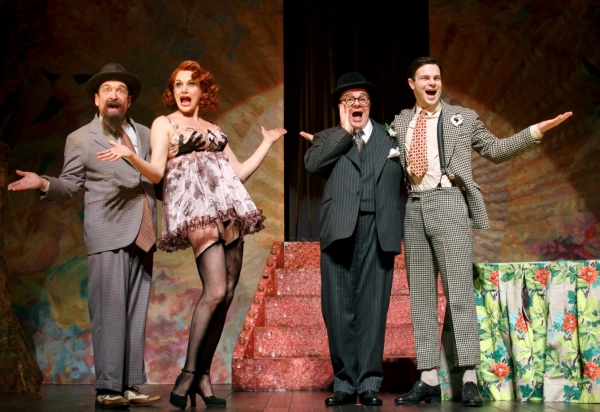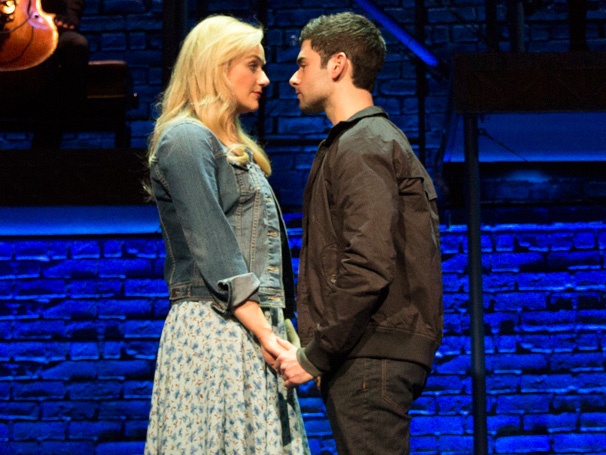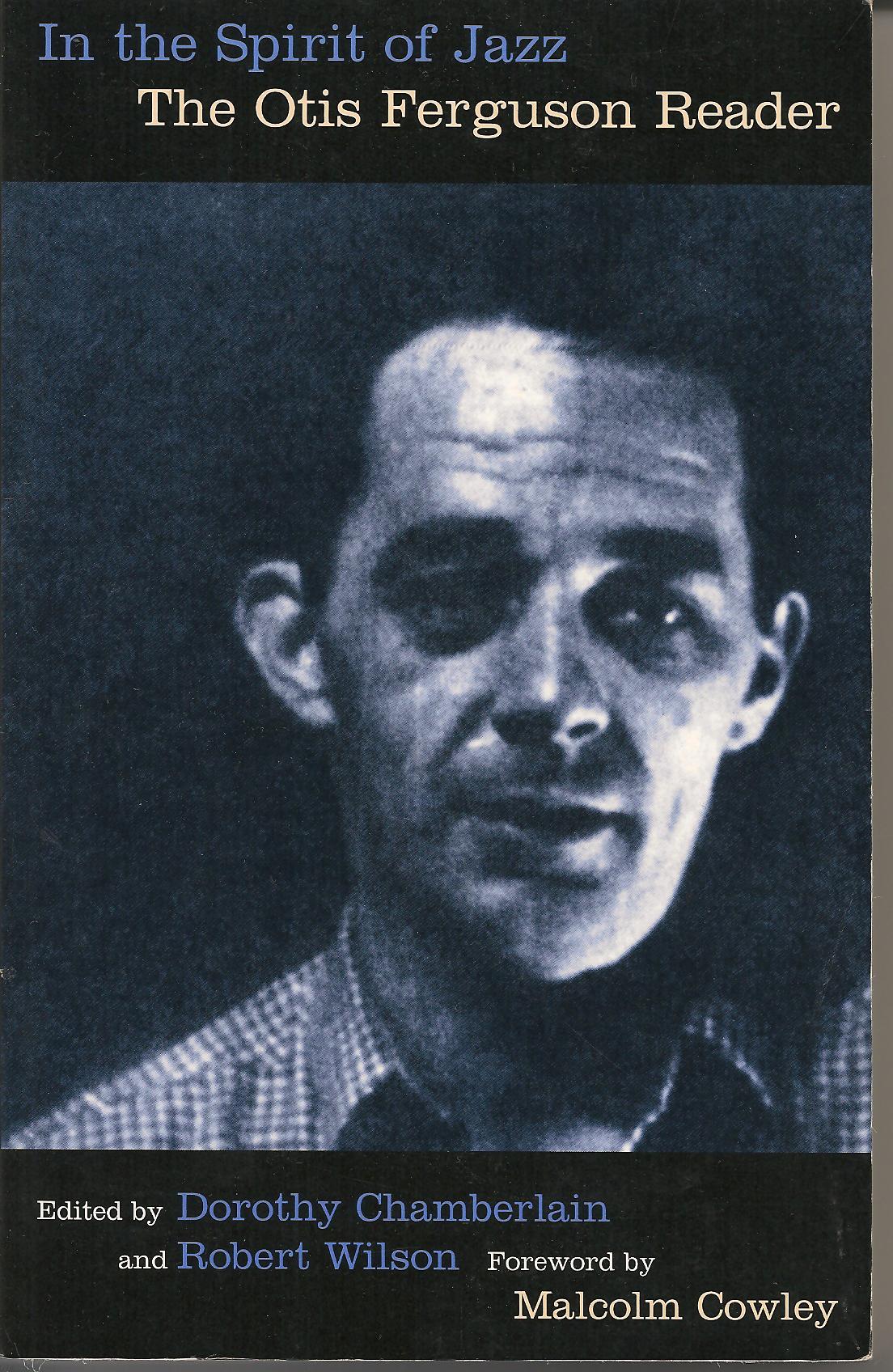“Words are, of course, the most powerful drug used by mankind.”
Rudyard Kipling (speech, quoted in the London Times, Feb. 15, 1923)
Archives for 2013
TT: Tears of a clown
So many shows are opening on Broadway this week and next that The Wall Street Journal has given me extra review slots to accommodate the overflow. In today’s paper I review The Nance and Motown, the first enthusiastically, the second sulfurously. Here’s an excerpt.
* * *
One o the most exciting things that a well-produced play can do is serve as a time machine, giving present-day audiences a privileged glimpse of the lost world of the past. That’s what Douglas Carter Beane does in “The Nance,” a dead-serious comedy set in New York circa 1937 in which Nathan Lane plays a self-hating gay man who makes a living playing outrageously effeminate gay men on the burlesque stage. Such comedians were known as “nances,” and most of them were straight. The paradox that drives “The Nance,” by contrast, is that Chauncey Miles, Mr. Lane’s character, is the real thing–but that he lives in an age when his own sexuality is not merely unmentionable but illegal. It’s an immensely promising premise, and Messrs. Beane and Lane, aided to the utmost by Jack O’Brien, the director, make the most of it.
 Produced on Broadway by Lincoln Center Theater, “The Nance” is a two-layered play in which authentic-sounding burlesque routines concocted by Mr. Beane and Glen Kelly, who wrote the original music, alternate with backstage scenes that show us in agonizing detail what Chauncey’s emotionally starved private life is like. A straight-ticket Republican (“Say something nice about Roosevelt and prepare to have your eyes scratched out”) who bristles at the very mention of socialism, he prefers his sex anonymous and takes it wherever he can find it….
Produced on Broadway by Lincoln Center Theater, “The Nance” is a two-layered play in which authentic-sounding burlesque routines concocted by Mr. Beane and Glen Kelly, who wrote the original music, alternate with backstage scenes that show us in agonizing detail what Chauncey’s emotionally starved private life is like. A straight-ticket Republican (“Say something nice about Roosevelt and prepare to have your eyes scratched out”) who bristles at the very mention of socialism, he prefers his sex anonymous and takes it wherever he can find it….
Mr. Beane’s previous plays and musical-comedy books have been by turns repellently bitchy (“The Little Dog Laughed,” “Mr. and Mrs. Fitch”) and cloyingly campy (“Lysistrata Jones,” “Xanadu”). Not so “The Nance,” in which he’s found a way to use the campiness that is his primary theatrical color to relevant and moving effect. It helps immeasurably, of course, that Mr. Lane is giving the kind of richly realized performance of which playwrights dream…
Berry Gordy, the Oz of Motown Records, has now given us an autobiographical jukebox musical called, naturally enough, “Motown: The Musical.” It’s a vanity production in all senses of the word, since Mr. Gordy wrote the book himself. The results should have been called “The Genius of Me: How I Singlehandedly Transformed American Culture, Made a Gazillion Dollars and Slept With Diana Ross.” If you’re willing to sit through two hours and 45 minutes’ worth of unbridled self-love, you’ll get to see a stageful of actors pretending to be Mr. Gordy, Ms. Ross, Marvin Gaye, Michael Jackson, Smokey Robinson, Stevie Wonder and other such folk. The songs are great, the performances predictably predictable, the sets stupefyingly expensive….
* * *
Read the whole thing here.
TT: Almanac
“Everyone is more or less mad on one point.”
Rudyard Kipling, “On the Strength of a Likeness”
TT: Just because
György Cziffra plays Liszt’s Grand galop chromatique in 1963:
(This is the latest in a series of arts-related videos that appear in this space each Monday and Wednesday.)
TT: Almanac
And all was as it should be. I was young.
Edwin Arlington Robinson, “Isaac and Archibald” (courtesy of Patrick Kurp)
TT: You come, too
In today’s Wall Street Journal I review Matilda and The Last Five Years. Here’s an excerpt.
* * *
The makers of “Matilda” have done the impossible–triumphantly. They’ve taken Roald Dahl’s popular children’s novel and turned it into a big-budget musical that is true enough to the book to satisfy its youthful readers, yet sophisticated enough to delight childless adults who normally wouldn’t be caught dead partaking of such kid stuff. It’s smart, sweet, zany and stupendous fun.
Originally published in 1988, “Matilda” is a revenge fantasy for eggheads, the story of a five-year-old prodigy whose favorite books include “Crime and Punishment,” “Tess of the d’Urbervilles” and “The Cat in the Hat.” Alas, Matilda’s aggressively anti-intellectual parents (Gabriel Ebert and Lesli Margherita) and stormtrooper-like headmistress (played in drag by Bertie Carvel) hate books and all who read them. Not to worry, though, for Miss Honey (Lauren Ward), a poor but kindly schoolteacher who fully appreciates her young charge’s talents, which turn out to include telekinesis, helps Matilda vanquish the wicked and live happily ever after.
Dennis Kelly, who wrote the book, has turned Mr. Dahl’s novel, parts of which are light on dialogue, into a fully stageworthy musical in which everything is shown rather than told. Tim Minchin’s riotously eclectic score skitters unpredictably from pop to jazz to semi-Sondheim to good old-fashioned razzmatazz….
 “The Last Five Years,” Jason Robert Brown’s two-handed musical about a young couple (Adam Kantor and Betsy Wolfe) who can’t make a go of their marriage, has returned to New York after 11 years in a revival immaculately staged by the author. Every aspect of this Off-Broadway production, from the strongly sung performances of Mr. Kantor and Ms. Wolfe to the playing of the six-person band, is guaranteed to satisfy.
“The Last Five Years,” Jason Robert Brown’s two-handed musical about a young couple (Adam Kantor and Betsy Wolfe) who can’t make a go of their marriage, has returned to New York after 11 years in a revival immaculately staged by the author. Every aspect of this Off-Broadway production, from the strongly sung performances of Mr. Kantor and Ms. Wolfe to the playing of the six-person band, is guaranteed to satisfy.
Whether you’ll want to see “The Last Five Years” depends on what you think of its subject matter. Mr. Brown freely admits that the show was inspired by the breakup of his own marriage to an actress. Jamie, the “hero,” is an up-and-coming novelist whose burgeoning success outstrips that of the neurotic Cathy, who is unable to come to terms with the awkward fact that his book is getting reviewed by John Updike in the New Yorker while she appears in second-rate summer theater in Ohio. So what does he do? Naturally, he dumps her…
What redeems “The Last Five Years,” up to a point, is Mr. Brown’s score. The music, which splits the difference between Hall & Oates and Ned Rorem, is better than the words, which could do with a medium-stiff dose of ironic detachment, but they fit together so comfortably as to overcome all objections–save to the premise of the show itself….
* * *
Read the whole thing here.
The original West End production of Matilda performs “Naughty” on last year’s Olivier Awards telecast:
TT: He got there first
In today’s Wall Street Journal “Sightings” column I pay tribute to Otis Ferguson, a great American critic who has yet to be properly remembered. Here’s an excerpt.
* * *
Most good writers get their due sooner or later, but sometimes an exceptional one slips through the cracks of renown. Consider the case of Otis Ferguson, who died in 1943. He invented American film criticism, more or less, and he wrote about popular culture of all kinds with intelligence, enthusiasm and a wide-open mind. Had he been more fortunate–or less brave–his work would be as well remembered today as that of James Agee or Pauline Kael. But in addition to being a pioneering critic, Ferguson was also a patriot who joined the Merchant Marine after Pearl Harbor and was blown up by a German bomb when he was just 36.
 That was 70 years ago, more than long enough for his stature as a writer to have been posthumously recognized. Alas, it has never happened, and both of his published essay collections, “The Film Criticism of Otis Ferguson” (1971) and “In the Spirit of Jazz” (1982) are out of print, though it isn’t hard to obtain used copies. To read them is to make the belated acquaintance of a critic who at his best was worthy of direct comparison with George Orwell, the writer whom he most closely resembled.
That was 70 years ago, more than long enough for his stature as a writer to have been posthumously recognized. Alas, it has never happened, and both of his published essay collections, “The Film Criticism of Otis Ferguson” (1971) and “In the Spirit of Jazz” (1982) are out of print, though it isn’t hard to obtain used copies. To read them is to make the belated acquaintance of a critic who at his best was worthy of direct comparison with George Orwell, the writer whom he most closely resembled.
A self-made intellectual, Ferguson came from working-class stock, serving a four-year stretch in the Navy to pay for his schooling. He started reviewing books for the New Republic in 1933 and became that magazine’s film critic in 1934, at a time when scarcely anyone else in America was writing regularly about movies. He added jazz to his critical portfolio two years later, publishing some of the first essays of substance about such now-legendary artists as Bix Beiderbecke, Duke Ellington and Benny Goodman….
Ferguson sensed that most Hollywood filmmakers were better at comedy than tragedy, and saw no reason to “snoot” their preference for the former. This set him apart from the vast majority of film critics in the ’30s, who were suckers for pseudo-serious movies and disdained pure comedy as a lesser species of art….
* * *
Read the whole thing here.
TT: Almanac
“History is bright and fiction dull with homely men who have charmed women.”
O. Henry, “Next to Reading Matter”
